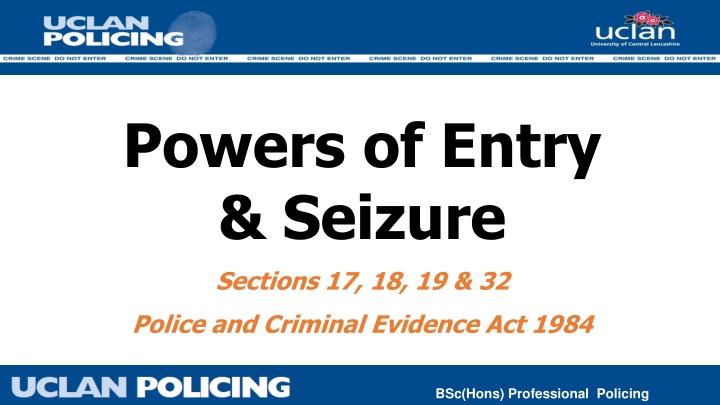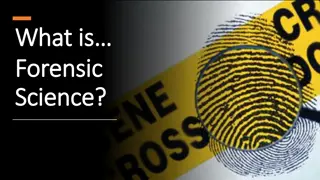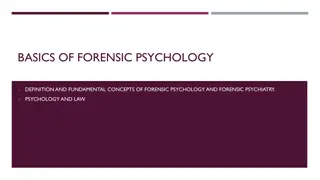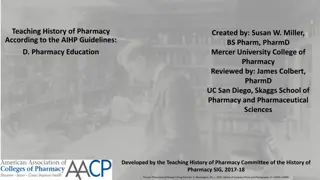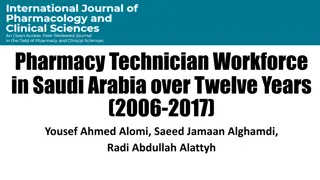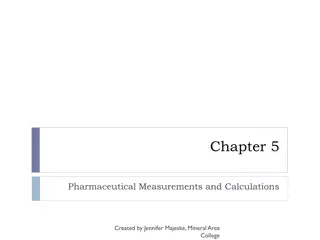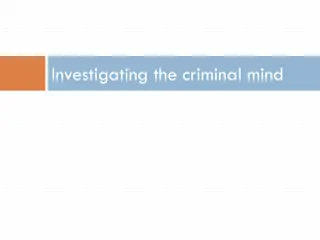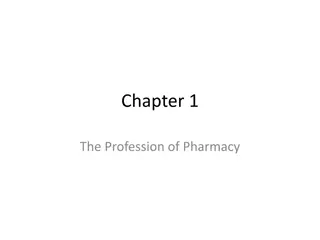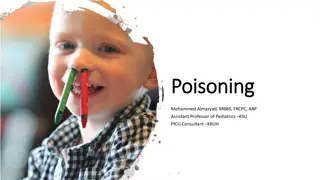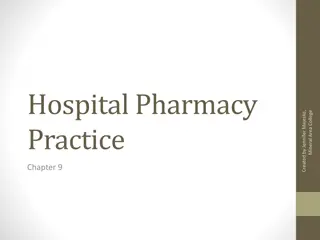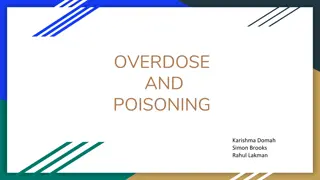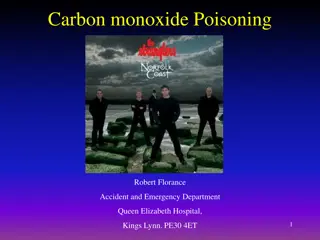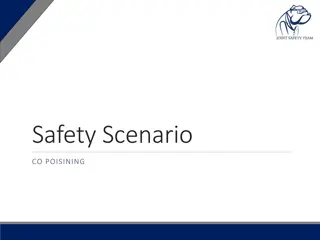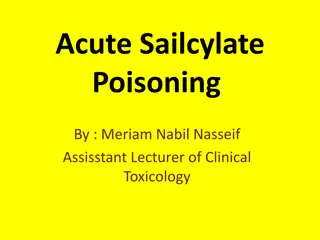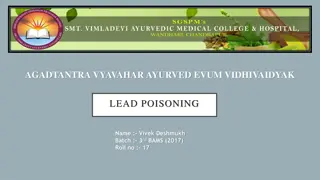Forensic Pharmacy and Poisoning Overview
In this insightful study, explore the nature, classification, and types of poisoning, including homicidal, suicidal, accidental, and occupational. Delve into the severity of poisoning and learn about acute, chronic, sub-acute, and fulminate cases. Understand the chief symptoms of different poisons and their effects on health. The discussion covers the administration, effects, and exposure to poisonous substances, shedding light on forensic pharmacy and accidental poisoning incidents.
Download Presentation

Please find below an Image/Link to download the presentation.
The content on the website is provided AS IS for your information and personal use only. It may not be sold, licensed, or shared on other websites without obtaining consent from the author.If you encounter any issues during the download, it is possible that the publisher has removed the file from their server.
You are allowed to download the files provided on this website for personal or commercial use, subject to the condition that they are used lawfully. All files are the property of their respective owners.
The content on the website is provided AS IS for your information and personal use only. It may not be sold, licensed, or shared on other websites without obtaining consent from the author.
E N D
Presentation Transcript
Powers of Entry & Seizure Sections 17, 18, 19 & 32 Police and Criminal Evidence Act 1984 BSc(Hons) Professional Policing
Section 17 PACE BSc(Hons) Professional Policing
Section 17(1) PACE a constable may enter and search any premises for the purpose (a) of executing (i) a warrant of arrest issued in connection with or arising out of criminal proceedings; or (ii) a warrant of commitment issued under section 76 of the Magistrates Courts Act 1980; BSc(Hons) Professional Policing
Section 17(1) PACE of arresting a person for a specified offence OR of recapturing any person who is, or is deemed for any purpose to be, unlawfully at large while liable to be detained OR of recapturing any person whatever who is unlawfully at large and whom he is pursuing; OR of saving life or limb or preventing serious damage to property. BSc(Hons) Professional Policing
Section 17(1) PACE OR of saving life or limb or preventing serious damage to property. BSc(Hons) Professional Policing
Section 17(1) PACE W execute warrant of arrest A arrest for indictable offence S specified offences pursuing person unlawfully at large/escapee S serious loss or damage to property P save life and limb/prevent BSc(Hons) Professional Policing
Premises Any place and in particular, any vehicle, vessel, aircraft, hovercraft offshore installation tent or other movable structure and Any renewable energy installation. BSc(Hons) Professional Policing
Section 18(1) PACE A police officer may enter and search any premises occupied or controlled by a person under arrest for an indictable offence, provided the officer has reasonable grounds for suspecting that there is on the premises evidence relating to that offence or another indictable offence which is connected with or similar to that offence, MUST be authorised by an Inspector or above. BSc(Hons) Professional Policing
Section 18(1) PACE Section 18(1) PACE C onstable may enter and search premises, O ccupied or controlled by a person, U nder arrest for an indictable offence if they have, R easonable grounds for suspecting they will find evidence relating to, T hat offence or other similar offences. BSc(Hons) Professional Policing
Section 18(5) PACE A police officer may conduct a search BEFORE taking the person to a police station or releasing them on street bail AND WITHOUT obtaining an authorisation from an Inspector IF the presence of that person is necessary for an effective investigation BSc(Hons) Professional Policing
Section 19(2) & 19(3) PACE A police officer may seize anything which is on the premises if the officer has reasonable grounds for believing that it has been obtained in the commission of an offence OR that it is evidence in relation to an offence which the officer is investigating OR any other offence and that it is necessary to seize it in order to prevent it from being BSc(Hons) Professional Policing
Section 19(2) & 19(3) PACE C concealed L lost A altered D damaged D destroyed BSc(Hons) Professional Policing
Section 32 PACE Where a person has been arrested for an indictable offence, A police officer may enter and search any premises in which that person was when arrested or immediately before they were arrested if they have reasonable grounds to believe there will be evidence relating to the offence for which they were arrested, P remises I mmediately before / at the time E vidence of offence for which arrested. BSc(Hons) Professional Policing
Section 32 PACE Although not a premises Section 32 also gives the power to Search a Person! A police officer may search any person who has been arrested at a place OTHER THAN a police station For any offence if he has reasonable grounds to believe the person has in their possession: D Dangerous Articles (danger to self or another) I Implement to aid escape E - Evidence of an offence (NB any offence, not just that arrested for) BSc(Hons) Professional Policing
Summary (Entry/Search of Premises) Section 17 search premises for a PERSON (reasonably believe to be there) to arrest, or to save life and limb / prevent serious loss or damage to property (do not need to believe anyone there) Section 18 after arrest for indictable offence search premises occupied or controlled by person, for evidence of that offence or one similar or connected BSc(Hons) Professional Policing
Summary (Entry/Search of Premises) Section 32 after arrest for indictable offence search premises where arrested or at immediately before, and there are Reasonable grounds to believe there will be evidence of the offence for which arrested Section 19 when lawfully on premises, gives power to seize articles which have been obtained during an offence, or are evidence of an offence BSc(Hons) Professional Policing
Summary (Search of Persons) Section 32 IF he has Reasonable grounds to believe the person Has in his possession: D Dangerous article(s) I Implement to escape E Evidence of AN offence (not necessarily the offence arrested for!) Section 32 Also authorises the searching of a person or persons: A police officer may search a person Arrested at a place OTHER THAN a police station BSc(Hons) Professional Policing
Powers of Entry & Seizure Powers of Entry & Seizure What do we need to be considering in any search? Intelligence, Risk assessments, Staff MOE, OST, Vehicles, Briefing etc, Community Beat Manager (CBM), Human Rights - Article 8, A Plan. BSc(Hons) Professional Policing
